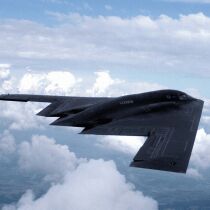
B-2 Stealth Bomber Compromised?
Classified B-2 Stealth bomber technology was leaked to China, say U.S. officials. A Hawaii-based spy allegedly obtained critical technology that will allow Beijing to copy and counter one of America’s most advanced weapons systems. Investigation reveals that U.S. Stealth technology may have been leaking since 1999.
In the November 15 grand jury indictment, Indian-born engineer Noshir Gowadia is charged with 18 counts of spying. Besides providing China with classified technology relating to the B-2’s engine exhaust system, he is also charged with several other counts of selling top-secret information.
Justice Department officials claim that Gowadia was paid approximately $2 million for the B-2 secrets. If true, China got a true bargain—paying pennies on the dollar for technology that took many years and probably cost hundreds of millions or more to develop.
U.S. experts familiar with the case say “the compromise of the B-2 technology is extremely damaging because it will give China key secrets on the bomber” (Washington Times,November 23).
B-2 bombers are part of what the Pentagon is calling its “hedge” strategy: to have forces in position and with the ability to swiftly defeat China in any future conflict. China’s procurement of this technology severely compromises that strategy.
Gowadia is also accused of providing China with extensive technical assistance to help it develop and test a radar-evading Stealth cruise missile, and also showing China how to modify the cruise missile to lock on to U.S. air-to-air missiles.
If what prosecutors say is true, the Stealth genie may be out of the bottle. Gowadia is also charged with divulging “secret” and “top secret” U.S. Stealth technology-related data pertaining to the th-98 Eurocopter and other foreign commercial aircraft to Germany, Switzerland and Israel between 2002 and 2004. All told, he is accused of offering classified defense information to as many as eight foreign nations.
Earlier this year, another espionage case involving China occurred, where two brothers (Chi and Tai Mak) were accused of being unregistered agents for the Chinese. Authorities accused the Mak family of trying to pass on restricted naval warship technology concerning the advanced ddx destroyer.
As one defense official pointed out, commenting on the Gowadia case, these recent incidents illustrate “China’s intelligence efforts to counter key weapons systems that give the United States strategic advantages over Chinese forces.”
For more on the strategic implications of these developments, read here.
